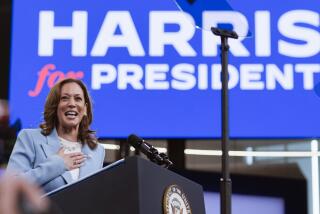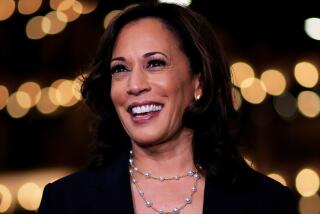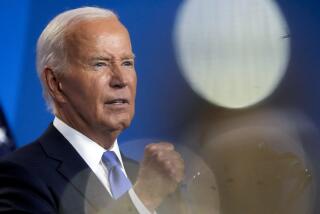Florida Democrats get â08 ultimatum
WASHINGTON â The Democratic National Committee voted Saturday to strip Florida of all its presidential convention delegates, threatening to leave the state without a voice in choosing the partyâs 2008 nominee, unless it delays the date of its primary election.
The ultimatum marks party leadersâ most drastic attempt yet to impose order among states that have been trying to elbow their balloting closer to the front of the election cycle. Three months ago, Florida controversially set its primary for Jan. 29.
The DNC Rules and Bylaws Committee voted overwhelmingly to give Floridaâs party 30 days to reschedule -- to Feb. 5 at the earliest -- or risk losing accreditation for its 210 delegates to the nominating convention next summer in Denver.
A refusal to seat delegates from the nationâs fourth most populous state could set the stage for floor fights and a public spectacle at a convention normally choreographed to show party unity.
The Iowa caucuses traditionally mark the nationâs first presidential contest, followed by the New Hampshire primary. The DNC recently agreed to allow Nevada and South Carolina to join the initial mix to bring more Latino and African American voters into the early balloting, but it barred any other state from holding a binding presidential primary before the first Tuesday in February, known as Super Tuesday, which next year is Feb. 5.
Officials said after Saturdayâs vote that harsh action against Florida was partly intended to send a strong message to Michigan and other states that were considering pushing their party contests into January.
Florida Democratic Party Chairwoman Karen Thurman said she and her colleagues had done everything possible to adhere to the rules. But Republicans who dominate the Legislature outmaneuvered them, she said, by including an earlier primary date in a bill of election reforms Democrats considered crucial -- forcing Democrats to vote for a Jan. 29 primary.
Republican Gov. Charlie Crist signed the legislation in May.
Still, Florida Democrats have alternatives, according to members of the DNC rules committee.
The Jan. 29 Democratic vote could be a nonbinding âbeauty contest,â or straw poll, to be followed in February by other balloting -- perhaps a separate primary, caucuses or a mail-in vote -- to meet the national partyâs rules, panel members said.
Thurman countered that mail-in balloting could cost $7 million to $8 million -- money she said wasnât available. âThis is a difficult situation for all of us,â she said.
As for party caucuses, Florida Democrats have investigated setting up 150 caucuses in February, according to a DNC member from Florida, Jon Ausman.
That plan would cost less than $1 million -- but caucuses inevitably would draw only a fraction of the stateâs 4 million Democrats, he warned, and would disenfranchise the 190,000 Floridians who cast absentee ballots, including many members of the military.
âWeâre asking you for mercy, not judgment,â he said.
But few on the rules committee offered much sympathy.
Member Garry S. Shay of California said that although his state contained 7.1 million Democrats and served as âthe ATM of the Democratic Party,â the state party resisted pressure to schedule its primary for earlier than Feb. 5.
Donna Brazile, a delegate from the District of Columbia, said she hesitated even to offer the Florida party âwiggle roomâ on its primary date: âSome people will moan, and some people will shout, but we have to follow the rules.â
In the end, the committee voted to give the Florida delegation a 30-day reprieve. âWe decided to punt for now,â said Harold M. Ickes, a Democratic operative and former aide to President Clinton.
Thurman, Floridaâs party chief, said she would confer with state party officials.
âI think we have seen the strong feelings here,â she told reporters. âThere is strong emotion.â
More to Read
Get the L.A. Times Politics newsletter
Deeply reported insights into legislation, politics and policy from Sacramento, Washington and beyond. In your inbox three times per week.
You may occasionally receive promotional content from the Los Angeles Times.











